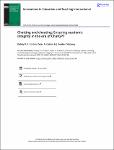Chatting and cheating: Ensuring academic integrity in the era of ChatGPT
| dc.contributor.author | Cotton, DRE | |
| dc.contributor.author | Cotton, PA | |
| dc.contributor.author | Shipway, JR | |
| dc.date.accessioned | 2023-03-16T12:40:43Z | |
| dc.date.available | 2023-03-16T12:40:43Z | |
| dc.date.issued | 2023-03-13 | |
| dc.identifier.issn | 1355-8005 | |
| dc.identifier.issn | 1470-3300 | |
| dc.identifier.uri | https://pearl.plymouth.ac.uk/handle/10026.1/20577 | |
| dc.description.abstract |
The use of artificial intelligence in academia is a hot topic in the education field. ChatGPT is an AI tool that offers a range of benefits, including increased student engagement, collaboration, and accessibility. However, is also raises concerns regarding academic honesty and plagiarism. This paper examines the opportunities and challenges of using ChatGPT in higher education, and discusses the potential risks and rewards of these tools. The paper also considers the difficulties of detecting and preventing academic dishonesty, and suggests strategies that universities can adopt to ensure ethical and responsible use of these tools. These strategies include developing policies and procedures, providing training and support, and using various methods to detect and prevent cheating. The paper concludes that while the use of AI in higher education presents both opportunities and challenges, universities can effectively address these concerns by taking a proactive and ethical approach to the use of these tools. | |
| dc.format.extent | 1-12 | |
| dc.language | en | |
| dc.publisher | Taylor and Francis Group | |
| dc.subject | Machine-generated writing | |
| dc.subject | plagiarism | |
| dc.subject | higher education | |
| dc.subject | detection and prevention | |
| dc.title | Chatting and cheating: Ensuring academic integrity in the era of ChatGPT | |
| dc.type | journal-article | |
| dc.type | Article | |
| plymouth.author-url | https://www.webofscience.com/api/gateway?GWVersion=2&SrcApp=PARTNER_APP&SrcAuth=LinksAMR&KeyUT=WOS:000948597000001&DestLinkType=FullRecord&DestApp=ALL_WOS&UsrCustomerID=11bb513d99f797142bcfeffcc58ea008 | |
| plymouth.issue | 2 | |
| plymouth.volume | 61 | |
| plymouth.publisher-url | http://dx.doi.org/10.1080/14703297.2023.2190148 | |
| plymouth.publication-status | Published | |
| plymouth.journal | Innovations in Education and Teaching International | |
| dc.identifier.doi | 10.1080/14703297.2023.2190148 | |
| plymouth.organisational-group | |Plymouth | |
| plymouth.organisational-group | |Plymouth|Research Groups | |
| plymouth.organisational-group | |Plymouth|Faculty of Health | |
| plymouth.organisational-group | |Plymouth|Faculty of Science and Engineering | |
| plymouth.organisational-group | |Plymouth|Faculty of Science and Engineering|School of Biological and Marine Sciences | |
| plymouth.organisational-group | |Plymouth|Research Groups|Marine Institute | |
| plymouth.organisational-group | |Plymouth|REF 2021 Researchers by UoA | |
| plymouth.organisational-group | |Plymouth|Users by role | |
| plymouth.organisational-group | |Plymouth|Users by role|Academics | |
| plymouth.organisational-group | |Plymouth|REF 2021 Researchers by UoA|UoA06 Agriculture, Veterinary and Food Science | |
| dcterms.dateAccepted | 2023-03-06 | |
| dc.date.updated | 2023-03-16T12:40:33Z | |
| dc.rights.embargodate | 2023-3-29 | |
| dc.identifier.eissn | 1470-3300 | |
| rioxxterms.versionofrecord | 10.1080/14703297.2023.2190148 |


